|
|
|
Sort Order |
|
|
|
Items / Page
|
|
|
|
|
|
|
| Srl | Item |
| 1 |
ID:
044721
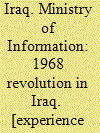

|
|
|
|
|
| Publication |
London, Ithaca press, 1979.
|
| Description |
176p.hbk
|
| Standard Number |
0903729458
|
|
|
|
|
|
|
|
|
|
|
|
Copies: C:1/I:0,R:0,Q:0
Circulation
| Accession# | Call# | Current Location | Status | Policy | Location |
| 018956 | 956.7043/IRA 018956 | Main | On Shelf | General | |
|
|
|
|
| 2 |
ID:
190682


|
|
|
|
|
| Summary/Abstract |
This study investigates the peace process between the Turkish government and the PKK, invoking the mutually hurting stalemate (MHS) and mutually enticing opportunity (MEO) formulations of Ripeness Theory. It questions why the negotiations failed although Turkey’s conditions had become ripe for resolution. This research shows that even though the ripe moment occurred before the process steered the parties toward the negotiation table, their perspectives regarding the table ultimately changed due to both domestic and international developments. Hence, the MHS seized at the beginning of the process did not turn into the MEO that would lead to resolution.
|
|
|
|
|
|
|
|
|
|
|
|
|
|
|
|
| 3 |
ID:
169333
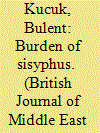

|
|
|
|
|
| Summary/Abstract |
ABSTRACT
This paper examines the contradictory transformation process the Kurdish movement has been experiencing over the last two decades and discusses its structural paradoxes and political shortcomings from a critical sociological perspective. Based on participant observation and interviews with activist researchers, the paper argues that the moral and ideological unity of the movement is challenged by ever-increasing social and mental divisions that are in turn prompted by forced displacement, rapid urbanization and diversified forms of social and symbolic inequalities within the Kurdish society. The fundamental division is between the emerging educated middle-class subjectivity, which has become the prime intellectual force leading the democratic political institutions, and the socially impoverished and radicalized urban youth, who have been active in contentious politics. This social division manifests within the dual organizational structures of the movement as twin and frequently contradictory dispositions. This schism also prevents the movement from building a much broader popular subjectivity to decolonize the social and political life.
|
|
|
|
|
|
|
|
|
|
|
|
|
|
|
|
| 4 |
ID:
096039
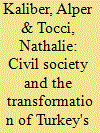

|
|
|
|
|
| Publication |
2010.
|
| Summary/Abstract |
This article explores the multilayered characteristics of civil society involvement in Turkey's Kurdish question. It examines the role and impact of Turkish and Kurdish civil society organizations (CSOs) in the conflict in terms of securitizing, holding and desecuritizing activities. It presents a comprehensive analysis of the identities, strategies and actions of these CSOs, as well as of the political opportunity structure in which they operate, including time-contingent factors, the domestic institutional and sociopolitical environment, and the involvement of external actors such as the EU. Despite increasing civil society involvement, Turkey's Kurdish question is still strongly shaped by the nature of the Turkish state and the manner in which it has responded to the Kurdish nationalist challenge. Whereas the specificities of the Turkish state have moulded the Kurdish nationalist challenge, the latter - and particularly the actions of the Kurdistan Workers' Party (PKK) - have further fuelled the securitizing discourse of the Turkish state establishment, fundamentally shaping and constraining the environment in which civil society operates.
|
|
|
|
|
|
|
|
|
|
|
|
|
|
|
|
| 5 |
ID:
105993
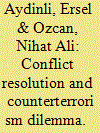

|
|
|
|
|
| Publication |
2011.
|
| Summary/Abstract |
This article considers the relationship between two processes-conflict resolution and counterterrorism-which conceptually share many common points, yet in practice do not necessarily proceed together easily towards a common goal. Considering particular cases of ethnic conflict in which terrorist factions exist, the article argues that while neither conflict resolution nor counterterrorism alone can adequately address the problem, simultaneously conducting both must keep in mind the processes' inherent differences and avoid excessive prioritizing of one over the other. By exploring recent Turkish governmental initiatives to address the Kurdish question, the article attempts to provide an outline for how to successfully cope with the two processes simultaneously.
|
|
|
|
|
|
|
|
|
|
|
|
|
|
|
|
| 6 |
ID:
153283
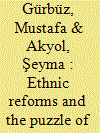

|
|
|
|
|
| Summary/Abstract |
Will pro-Kurdish reforms decrease ethnic violence in Turkey? Conventional wisdom would suggest that elimination of the root causes will heal past wounds. In bitter ethno-political conflicts, however, the issue becomes much larger than its components: deep mistrust between parties overshadow specific issue reforms. Turkey’s Kurdish issue is a case in point where ethnic reforms would not bring stability unless they are coupled with steps to eliminate mistrust. This article pays a specific attention to public framing of reforms. We argue that the actual content of reforms is not so significant; what really matters, instead, is the public perception of reforms on both sides, Turkish and Kurdish. The AKP’s claim of “democratic opening” loses credibility in recent years as the PKK’s alternative narrative gains prominence.
|
|
|
|
|
|
|
|
|
|
|
|
|
|
|
|
| 7 |
ID:
175138
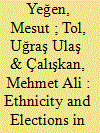

|
|
|
|
|
| Summary/Abstract |
Relying on a survey conducted in 2014 in 12 provinces in eastern Turkey, this article analyses the extent to which (a) ethnicity and religiosity shape Kurds’ electoral choices and (b) the Kurds in the East support the demand for education in Kurdish and the demand for self-rule for Kurds. The findings demonstrate that ethnicity is an important factor in shaping Kurds’ electoral choices and that the demands for education in Kurdish language and self-rule are backed not only by the vast majority of those Kurds who support the pro-Kurdish party but also by a significant number of those Kurds who support the AK Party.
|
|
|
|
|
|
|
|
|
|
|
|
|
|
|
|
| 8 |
ID:
159233
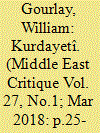

|
|
|
|
|
| Summary/Abstract |
The advance of ISIL amid the horrors of the Syrian civil war has given impetus to the forging of political solidarity among Kurds across international borders. This article examines Kurdayetî, pan-Kurdish identification, and the way in which it is shaped by ongoing crises in the Middle East. Amid chaotic events, previously divided Kurdish populations have increased cross-border interaction and co-operation. In northern Syria, Kobani became a bellwether of pan-Kurdish hopes and fears, and a rallying point, with peshmerga from Iraqi Kurdistan passing through Turkey to help relieve the ISIL siege of the city. Meanwhile, Kurdish political groups, particularly the PYD in Syria and the Kurdistan Regional Government, have made strategic gains, raising prospects, in some quarters, of Kurdish independence. Kurdish military forces also have won international recognition (and some logistical support) for the significant role they have played in fighting ISIL. This, in turn, has heightened concerns among regional states, chiefly Turkey, which is traditionally wary of political advances for the Kurds. This article incorporates ethnographic data gathered in 2014 and 2015 in Diyarbakır and Istanbul, to analyze the surge in pan-Kurdish solidarity, confidence and political assertiveness, and the implications these have for the Kurds and the states that surround them.
|
|
|
|
|
|
|
|
|
|
|
|
|
|
|
|
| 9 |
ID:
161484
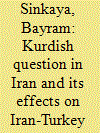

|
|
|
|
|
| Summary/Abstract |
The Kurdish question has played a complicated role in relations between Iran and Turkey. After the emergence of modern states, Iran and Turkey were mostly preoccupied with security issues, which dominated relations between the two countries. Then, the Kurdish issue occupied a leading place in Iranian-Turkish relations either as a source of conflict, competition or as a source of cooperation. This article aims to review the Kurdish question in Iran, and influence of the Kurdish issue on Iran-Turkey relations since the ‘Islamic revolution’ of 1979. In this regard, it addresses the Kurdish question as a security issue in Iran and analyzes the Islamic Republic’s policies with regards to it. And then it turns to Iranian-Turkish relations and analyzes the role of the Kurdish question as a source of conflict, competition and cooperation between the two countries. Finally it deals with implications of the new regional dynamics of the Kurdish question and their effects on Iran’s relations with Turkey.
|
|
|
|
|
|
|
|
|
|
|
|
|
|
|
|
| 10 |
ID:
139360
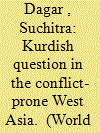

|
|
|
|
|
| Summary/Abstract |
No other region in the world has seen as much violence, physical destruction and civilian casualties, internal displacement of population, militarization of society and enduring psycho-social trauma in the past decade as West Asia. With the increase in the number as well as intensity of armed conflicts in the region since the US-led invasion of Iraq in March 2003, West Asia remains the locus classicus of recurrent warfare.
|
|
|
|
|
|
|
|
|
|
|
|
|
|
|
|
| 11 |
ID:
111242
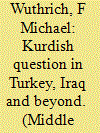

|
|
|
| 12 |
ID:
178602
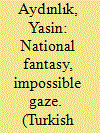

|
|
|
|
|
| Summary/Abstract |
This essay explores representations of the Kurdish question in the new popular films of Turkey including Eşkıya/The Bandit, Vizontele, Deli Yürek: Bumerang Cehennemi/Wildheart: Hell of Boomerang, Kurtlar Vadisi: Iraq/Valley of the Wolves: Iraq, Güneşi Gördüm/I Saw the Sun, Nefes/The Breath and Mucize/The Miracle. I use the notion of ideological fantasy to explain how filmic reality is constructed within these films. I argue that popular films of new Turkish cinema addressing the Kurdish question are national fantasies reconstituting the social, historical and political realities of the problem in accordance with the changing state discourse.
|
|
|
|
|
|
|
|
|
|
|
|
|
|
|
|
| 13 |
ID:
159234
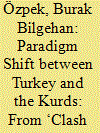

|
|
|
|
|
| Summary/Abstract |
Throughout the history of the Turkish Republic, its military and political elites in Ankara have regarded the Kurdish question as a security issue. Therefore, initiating the ‘peace process’ with the PKK and developing intimate relations with the Kurdistan Regional Government (KRG) have been regarded as deviations from the Turkish state’s traditional policy toward the Kurdish question. However, the optimism that the peace process generated gradually has disappeared as the Justice and Development Party (AKP) in Turkey and the Kurdistan Democratic Party (KDP) in the Kurdistan Regional Government have resorted to increasingly authoritarian policies. The declining democratization performance of the AKP and the KDP has deepened the internal divisions in both societies and bilateral relations between Turkey and the KRG have transformed into inter-governmental solidarity rather than institutional peace. Since the end of the ‘peace process’ following the June 7 national elections in 2015, the AKP has refused to deal with its country’s Kurdish actors, which, it says, are linked to the PKK and its ideology. Meanwhile, the AKP’s increasingly authoritarian policies have excluded non-AKP voters’ views from the policy-making process. Therefore, the cooperation between Turkey and the KRG has excluded half of the Turks and the Kurds at best. Consequently, the traditional ethnicity-based confrontation between the Turks and Kurds has been replaced, on the one hand, by an alignment among the AKP, the conservative Kurds of Turkey, the KDP and its allies in Northern Syria, and on the other hand, are the Peoples’ Democratic Party (HDP), the Patriotic Union of Kurdistan (PUK), Gorran, the Democratic Union Party (PYD) and some sections of the secular, middle class and Turks discontented with the AKP regime.
|
|
|
|
|
|
|
|
|
|
|
|
|
|
|
|
| 14 |
ID:
144923
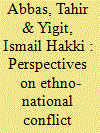

|
|
|
|
|
| Summary/Abstract |
This article reports the findings of an ethnographic study of families with members involved in the armed struggle for Kurdish nationalism led by the Kurdistan Workers' Party. Based on in-depth, semi-structured interviews and observations with a theoretical sample of six families in the area of Yüksekova, detailed discussions were held with twelve members of families with children, partners, or siblings involved in the conflict. Ethno-national exceptionalism plays a significant role in determining the motivations of political violence among groups, but with the additional background of the perceptions and realities of systematic racialization, de-territorialization, disenfranchisement, and cultural exclusion that affect certain Kurdish groups. The findings in this article offer critical sociological and anthropological accounts of the localized drivers of ethno-nationalism, and the motivations for and the experiences of conflict among families with members involved in the armed conflict and the “Kurdish question” in Turkey.
|
|
|
|
|
|
|
|
|
|
|
|
|
|
|
|
| 15 |
ID:
158064
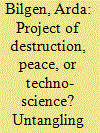

|
|
|
|
|
| Summary/Abstract |
The Southeastern Anatolia Project (Güneydoğu Anadolu Projesi, GAP) was initiated in the 1970s to produce energy and irrigate arid lands through constructing dams and hydroelectric power plants on the Euphrates and Tigris rivers and extensive irrigation networks in southeastern Turkey. Over time, the project was expanded to achieve a wider range of goals in different fields and radically transform Southeastern Anatolia Region. It is also widely claimed that GAP was initiated to address the root causes of the Kurdish question in Turkey and that security considerations and political calculations were actually the raison d’être of GAP. However, this supposed link between GAP and the Kurdish question was often established in a simplistic manner and the question how these two have been related – or not – remained largely untangled. This article aims to fill this research gap and examine the complex and multi-dimensional nature of the interrelationship between GAP and the Kurdish question based on diverse primary and secondary data sources. Accordingly, the article identifies and discusses major narratives in which GAP was conceived as a political and strategic ‘anti-Kurdish’ plot; remedy for the conflict; and totally technical non-political project and presents an alternative and more accurate perspective on how to interpret this relationship.
|
|
|
|
|
|
|
|
|
|
|
|
|
|
|
|
| 16 |
ID:
129497
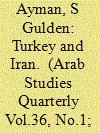

|
|
|
|
|
| Publication |
2014.
|
| Summary/Abstract |
The article starts by stressing the distinctive features of Turkish-Iranian relations. It argues that in order to understand the different stages in Turkish-Iranian relations one needs to define the fine between competition and rivalry, which are usually used interchangeably. It explains the common concerns that united and fostered cooperation between Turkey and Iran as well as the different that persisted after the US invention of Iraq. Delineating under what sort of conditions Turkey emerged as a competitor in Iraq, it evaluates the main instruments Ankara and Tehran employed in their efforts to affect the future of that country. In an effort to explain why this competition heightened, carrying the risk of transforming the two countries' relationship to a rivalry, it elaborates on both countries' approaches and concerns vis-à-vis Syria and the role of the US in shaping the two countries' interactions.
|
|
|
|
|
|
|
|
|
|
|
|
|
|
|
|
| 17 |
ID:
126455
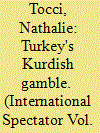

|
|
|
|
|
| Publication |
2013.
|
| Summary/Abstract |
Relations between Turkey and Northern Iraq have evolved at a breathtaking pace, with Turkish policies currently bolstering the KRG's drift towards independence, a prospect considered unthinkable in Ankara only a few years ago. Energy politics is an important component of this puzzle, but Ankara's strategic choice can only be understood against the backdrop of Iraq's deepening sectarianisation, the unfolding civil war in Syria and the dynamics in Turkey's own Kurdish question. The Turkish government is pursuing a high risk/high gain strategy. A more democratic Turkey, in partnership with the KRG, would be best placed to hedge against the centrifugal sectarian trends afflicting its southern neighbours. It is far more likely that Turkey will win its gamble with the support of the European Union.
|
|
|
|
|
|
|
|
|
|
|
|
|
|
|
|
| 18 |
ID:
175048
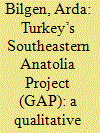

|
|
|
|
|
| Summary/Abstract |
The Southeastern Anatolia Project (Güneydoğu Anadolu Projesi, GAP) is one of the largest regional development projects ever implemented in the Middle East. Launched officially in the 1970s to develop the water and land resources of southeastern Turkey, GAP has over time evolved from a predominantly technical, largely state-led and mainly infrastructural and economic development-oriented project into a primarily social, largely market-friendly and chiefly sustainable and human development-oriented project. Parallel to this evolution, GAP has grown more visible in political and public discourses. The implications of the project, for instance, on the ecology and cultural heritages, on the Kurdish Question, and on water issue among Turkey, Syria and Iraq have become clearer. However, despite growing academic and policy interest on GAP, there has been no attempt to provide a literature review on the project. Even more than 40 years after GAP was begun, a bird’s eye view of researched and under-researched topics in the literature has not been introduced yet. This article seeks to present a qualitative review of GAP-related literature. In this way, it seeks to constitute an initial step to establish a base for more expansive reviews and to provide guidance to interested and involved researchers, practitioners and policymakers.
|
|
|
|
|
|
|
|
|
|
|
|
|
|
|
|
| 19 |
ID:
129561
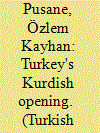

|
|
|
|
|
| Publication |
2014.
|
| Summary/Abstract |
Turkish state actors have used mainly military means to first suppress the Kurdish rebellions and then to end the PKK violence from 1984 onwards. However, after the AKP came to office in 2002, the government challenged the hardline state policy and initiated a Kurdish opening. This policy has the ultimate goal of disarming the PKK and resolving the Kurdish question. However, the Kurdish opening so far has failed to bring about the desired policy outcomes because the parties to the Kurdish question have been highly divided on the side of both the state and the Kurds in Turkey.
|
|
|
|
|
|
|
|
|
|
|
|
|
|
|
|
|
|
|
|
|